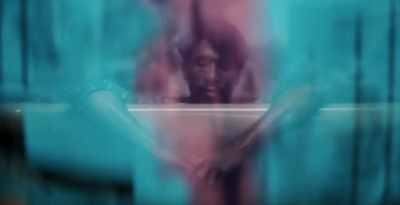The Fire Next Time
King arrived in Memphis on March 29 to lend support to striking sanitation workers. The Memphis sanitation strike - documented, along with King's murder, in the wonderful film At the River I Stand - lasted 65 days and involved nearly one thousand of the city's hyper-exploited black workers. On April 3, King gave one of his most famous speeches to an audience gathered at Mason Temple. He was visibly exhausted, collapsing into a chair as the final applause bellowed (an autopsy later revealed that at age 39, King's heart was like that of a 60-year-old).
Through the written word, James Baldwin, as voiced by Samuel L. Jackson in the film I Am Not Your Negro, recalls the moment he learned of King's death.
Billy Dee Williams had come to town and he was staying at the house. I very much wanted Billy Dee for the role of Malcolm. The phone had been brought out to the pool, and now it rang. And I picked up. The record player was still playing. "He's not dead yet, but it's a head wound." I hardly remember the rest of the evening at all. I remember weeping, briefly, more in helpless rage than in sorrow, and Billy trying to comfort me. But I really don't remember that evening at all.And of the funeral, days later.
The church was packed. In the pew before me sat Marlon Brando, Sammy Davis, Eartha Kitt. Sidney Poitier nearby. I saw Harry Belafonte sitting next to Coretta King. I have a childhood hand over thing about not weeping in public. And I was concentrating on holding myself together. I did not want to weep for Martin. Tears seemed futile. But I may also have been afraid, and I could not have been the only one, that if I began to weep, I would not be able to stop. I started to cry, and I stumbled. Sammy grabbed my arm.Baldwin was 44 on April 4, 1968. Sitting in a cell in Seattle's King County Jail, Aaron Dixon was just 18. In his memoir, My People are Rising, the soon-to-be captain of Seattle branch of the Black Panther Party describes what was otherwise a typical "dreary" Seattle day, "when the rain drizzles down constantly and passively."
Then suddenly, Walter Cronkite came on the TV with a grave expression on his face. We Weren't sure what we heard coming out of his mouth. Even as we stopped our conversation and listened closely, we were still uncertain. "Today, in Memphis, Tennessee, Martin Luther King Jr. was assassinated." The word assassinated reverberated in my head, almost throwing me off balance. Carl and Larry gasped. "What?" What NO, man, no, man, this can't be real," said Larry. We looked at each other in shock. Walter Cronkite continued the broadcast, talking about the assassination and the riots that were beginning to break out in Harlem, Chicago, and Detroit. Stokely came on in Washington, DC, holding a .22-caliber pistol, shouting, "It's time to burn, burn, baby, burn!" as crowds of young people rampaged through the streets of DC.
I thought back to when I was twelve and sat on the corner of that bandstand listening to Martin, looking out on the crowd, feeling somehow responsible for his well-being, looking at his smooth face, feeling his love. Despite becoming impatient with his nonviolent, nonthreatening approach, we young organizers still greatly admired his courage. He was our modern-day savior.
Anger filled me that night. There would be no more tears and no more dialogue. The war began that night all across America. I vowed to myself that Martin's death would not go unavenged. If a man of peace could be killed through violence, then violence it would be.
I was based in Hollywood, working on the screen version of the autobiography of Malcolm X. This was a difficult assignment, since I had known Malcolm, after all, crossed swords with him, worked with him, and held him in that great esteem which is not easily distinguishable, if it is distinguishable, from love. Billy Dee Williams had come to town and he was staying at the house. I very much wanted Billy Dee for the role of Malcolm. The phone had been brought out to the pool, and now it rang. And I picked up. The record player was still playing. "He's not dead yet, but it's a head wound." Read more: https://www.springfieldspringfield.co.uk/movie_script.php?movie=i-am-not-your-negro
Billy Dee Williams had come to town and he was staying at the house. I very much wanted Billy Dee for the role of Malcolm. The phone had been brought out to the pool, and now it rang. And I picked up. The record player was still playing. "He's not dead yet, but it's a head wound." Read more: https://www.springfieldspringfield.co.uk/movie_script.php?movie=i-am-not-your-negro
Billy Dee Williams had come to town and he was staying at the house. I very much wanted Billy Dee for the role of Malcolm. The phone had been brought out to the pool, and now it rang. And I picked up. The record player was still playing. "He's not dead yet, but it's a head wound." Read more: https://www.springfieldspringfield.co.uk/movie_script.php?movie=i-am-not-your-negro
I was based in Hollywood, working on the screen version of the autobiography of Malcolm X. This was a difficult assignment, since I had known Malcolm, after all, crossed swords with him, worked with him, and held him in that great esteem which is not easily distinguishable, if it is distinguishable, from love. Billy Dee Williams had come to town and he was staying at the house. I very much wanted Billy Dee for the role of Malcolm. The phone had been brought out to the pool, and now it rang. And I picked up. The record player was still playing. "He's not dead yet, but it's a head wound." Read more: https://www.springfieldspringfield.co.uk/movie_script.php?movie=i-am-not-your-negro

Comments
Post a Comment